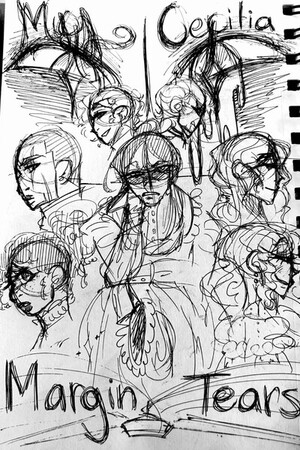Chapter 43:
Power Moves
Margin Tears: My Cecilia
By the next night, Cecilia had learned the rhythms of the house with a precision that would have frightened her if she were not so committed in her goals. She moved silently through corridors, past rooms that seemed ordinary but might shift or fracture at any misstep. Every creak of a floorboard, every sway of a chandelier, was cataloged in her mind. The manor’s pulse, once alien and oppressive, had become something she could follow.
Her book was her guide. Its riddles were no longer merely curiosities; they were tools.
"All things obey when coaxed, yet resist when forced," one passage read. "Seek the whisper behind the wall, the hesitation beneath the floor."
Cecilia had taken to testing the passage literally. First, she focused on small objects: a candle, a brass doorknob, a jug of water in the servants’ hall. Slowly, deliberately, she traced her fingers over their edges, imagining them bending toward her will.
The candle wavered. The flame tilted—not with air, but toward her finger. The doorknob hummed faintly in her palm, its metal cooling beneath her touch. The water rippled unnaturally, forming a smooth, rising arc that defied gravity for a heartbeat before settling back.
Each success filled her with awe—and terror. Every manipulation stretched her mind thinner, making her stomach knot, making her pulse drum. Yet it confirmed the truth she had glimpsed in the west wing: reality here was malleable.
And that meant Olrin’s power, as vast as it seemed, was not absolute.
…
The next experiment was bolder. In the servants’ hall, Cecilia traced the faint seam along the edge of the wallpaper. It had always been slightly uneven, curling in the corners as though the house were breathing. Following the book’s riddles, she whispered the instructions aloud:
"The fold bends to patience; the warp yields to understanding. Touch lightly, and see the world breathe with you."
Cecilia’s fingertips brushed the curl. The wall rippled under her hand, subtle at first, then more distinctly. She pressed and traced, guiding the surface with her thought alone. A picture frame shifted, tilting imperceptibly, then straightening, as if obeying her intention.
Her chest tightened. Each small victory felt like a theft from the lord’s dominion. But her triumph was laced with dread. One wrong move, one overreach, and he could notice.
And she knew punishment would follow, quick and slow, a thorough dissection of her will and spirit.
…
By the third night, she ventured deeper. She entered the west wing again, approaching the hedge where she had first manipulated the garden. Now, emboldened, she tried to expand it further. She followed the book’s riddles as one might follow a map through a dark forest: tracing seams, coaxing shapes, murmuring passages to steady her mind.
The garden shifted, responding in small increments. Trees bent slightly, shadows curled to meet her hand, a flower unfurled at her command. But the void—the empty corner—reacted violently. The white space recoiled like a wound exposed to light, jerking and pulsing in resistance. Cecilia faltered, nearly collapsing.
"The world will fight," the book whispered, almost as if it sensed her hesitation. "The stronger your will, the stronger it pushes back. Persist, or be unmade."
Her hands shook, and she pressed harder, forcing the void to fold into itself. Slowly, painfully, the empty space softened. Grass sprouted. Ivy crawled into the corners. She had made it yield—but her head throbbed, her vision blurred, and the taste of metal filled her mouth. The exertion was not merely physical; it stretched her mind across the seams of reality itself.
Cecilia stumbled back, clutching her stomach, panting. Every instinct screamed at her to stop.
But another part of her—the part burning with anger, grief, and resolve—whispered: Do not stop. Not now. Not ever.
She returned to her room, the book open across her lap, tracing symbols with her fingers that pulsed faintly beneath the candlelight. Her experiments had been crude, imperfect, yet undeniable. She could bend the world. She could fight.
Yet, she could also be caught.
A shiver ran down her spine. Somewhere in the manor, she felt it—a subtle shift, a watching presence. Olrin’s eyes. Perhaps he knew already, or perhaps the house itself whispered his awareness.
Cecilia pressed her hands to her eyes and sighed to herself, bouncing on her legs before delivering a couple of sharp, determined slaps to her cheeks.
The candle flickered. The book pulsed faintly. Beyond the walls, the manor slept—or pretended to.
But Cecilia knew the war had begun.
…
Cecilia had learned caution. Every step, every gesture, every breath in the manor was measured now. The house was vast, its halls a labyrinth of mirrors, chandeliers, and shifting shadows, and yet she moved through it like a hunter, listening for the smallest crack in the floorboards or echo of a displaced whisper.
Her experiments continued in secret. The hedge outside the west wing was bending more convincingly now, the void curling into life under her touch. Candles tilted toward her hand. Doorknobs shivered when she imagined them turning. Each small success emboldened her, but each also left a residue of strain in her mind: nausea, exhaustion, and a quiet, persistent fear that she had been noticed.
And she had.
Olrin had not yet confronted her, but his presence began to creep into her experiments in ways subtle and chilling. She first noticed it as an irregularity: a candle she had tilted toward herself one night burned perfectly straight the next, as though corrected by an unseen hand. A window she had coaxed open closed just slightly too soon, making her stumble back in surprise. Mirrors reflected her movements with a fractional delay that wasn’t there before.
It was as if the house itself was aware, an extension of him, monitoring, measuring, testing.
That evening, she dared to venture into the library. The great room smelled of dust and old ink, the tall shelves looming like silent sentinels. Cecilia traced her fingers along the spines of the books, following the instructions of her guide—
"Push lightly where the weave is thin, speak softly to coax it open, but watch for the shadow that listens."
Her pulse quickened. She focused on a narrow seam between two shelves, imagining the wood bending just enough to reveal a hidden alcove. The seam wavered. A panel shifted slightly—but then froze, as if resisting. She whispered another passage from the book, guiding her hands with intent. Slowly, the gap widened. A small, dusty space appeared behind the shelves.
And she felt it.
A presence, cold and deliberate, brushing against her mind. She froze, spine stiff, heart hammering. It was not a shadow, not a reflection, not the house—It was him. She could not see him, could not hear him, yet the awareness was absolute: a probing glance, testing, gauging her resolve.
Cecilia swallowed. The void of the library seemed to expand around her, stretching and tilting in imperceptible ways. The candlelight flickered unnaturally. She could almost hear a faint, critical whisper, threading through her thoughts—
So…really, truly you dare?
She clenched her fists, forcing her fear into determination. “Yes,” she whispered aloud. “I dare.”
Her voice echoed softly in the cavernous room, bouncing off the shelves, as though the walls themselves recorded the defiance. She reached into the alcove she had coaxed open, brushing aside dust. Her fingers touched a rough surface—stone, solid, real—and her heart leapt. Proof that she could bend more than illusions.
The sensation was intoxicating, but fleeting. She heard a subtle click behind her, almost too soft to notice. A book fell from a high shelf with perfect precision, landing open at a page she had read just yesterday. Not by chance, she knew; someone—or something—was leaving it there, a reminder, a warning.
Cecilia’s hands trembled as she picked it up. The page pulsed faintly, as if alive, the riddles writhing under her fingertips. She murmured the passages aloud, grounding herself, but every word seemed heavier now, laden with the weight of his unseen scrutiny.
The experiments would have to continue in stealth, in whispered gestures and measured touches. One misstep, one overreach, and Olrin would intervene. And she understood now that the house itself could betray her, obeying his will even when she thought she had a private seam.
Yet she did not stop. Not now. Not ever.
The alcove, small and secret, promised opportunity. It was her first real victory, her first tangible proof that the world could be manipulated. But it also reminded her that Olrin was never truly absent, never truly blind. He was the seam in which all folds converged—the shadow in the corners, the pulse in the walls, the breath behind her own.
Cecilia closed her eyes, hands still on the book, and whispered to herself—
“He may watch. He may test. But the cracks exist. I will find them all, and I will make them mine.”
The candle flickered again, more violently this time, as though echoing a threat—or a promise. She swallowed hard, steeling herself. Every experiment would now be a gamble, a battle of wits and willpower. And she would need all the cunning, patience, and courage she could muster to survive it.




Please sign in to leave a comment.